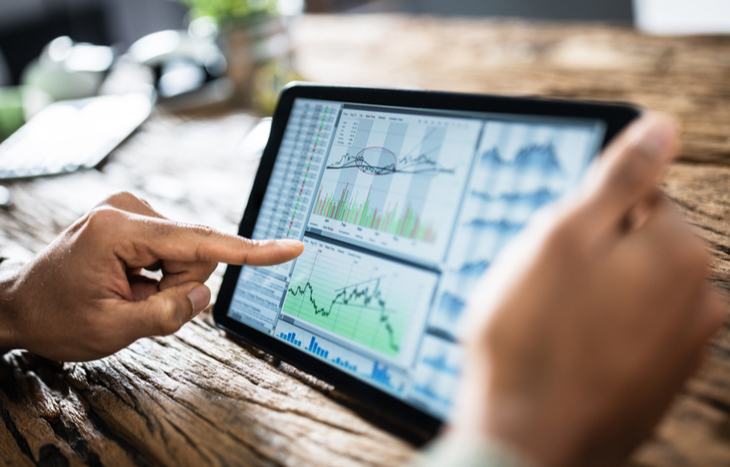Why Invest in Stock Pattern Recognition Software?
If you’re considering a full-time or even part-time career in day trading, one of the best investments you can make is in stock pattern recognition software. While every brokerage offers tools for chart analysis and technical investigation, few offer more advanced pattern recognition software, even to Level 2 accounts. To get the specific tools you need to chart and trade accurately against patterns, you’ll need to look beyond your broker.
There’s a world of stock pattern recognition software out there. Much of it comes down to preference and user interface. Although, there are some tools that offer more than others. But as you start to consider costs and fees, tools, and other features, take a step back and ask yourself why you need pattern recognition software.
Even if you’re adept at spotting chart patterns, pattern recognition software offers opportunities that go beyond diagnosing patterns. Here’s a look at some of the best reasons to consider pattern recognition software and how it promotes a better return on investment when day trading.

1. Stock Pattern Recognition Software Proves That Patterns Aren’t Perfect
Rarely are patterns cut and dried. It takes time and practice to spot patterns with any level of consistency. Even then, seasoned traders can make mistakes. You might misdiagnose a flag, pennant or wedge, or see a butterfly where there’s actually a bat. Many patterns are so closely related that, until they’ve formed, you have no idea which one you’re dealing with at a glance.
Stock pattern recognition software is smarter than you are. It can sport forming patterns with great accuracy. How? By doing the technical due diligence behind pattern identification. It can spot the difference between a butterfly and a bat thanks to preprogrammed technical indicators and algorithms that make a clear distinction where there otherwise isn’t a clear visual indicator. Even when patterns don’t manifest perfectly on the chart, the software will spot them.
2. Built-In Calculations
As mentioned, part of qualified pattern recognition is the ability to check a pattern against technical fundamentals. Chart pattern software can perform complex calculations in seconds to offer insight you might not otherwise have.
Consider Fibonacci ratios, for example. You might think you’re onto a harmonic pattern, like a crab or butterfly. But you need to do retracements to prove it. Instead of plugging data into a calculator, most stock pattern recognition platforms will have these ratios built in (with tolerances). In seconds, you can see whether the harmonic pattern you suspect falls in line with proper retracements. If it does, it’s confirmation for your strategy; if not, it can put you onto a new strategy for that security.
It doesn’t stop at Fibonacci ratios, either. Built-in calculations can automatically help you establish stop losses and target prices. It can even help you calculate the best hedge positions in something like a bilateral pattern.
3. Candlestick Charting
Every trader knows the importance of candlestick charting. It’s an instant way to see volume and trading action of a stock. And there are even more technical patterns that make themselves known through candlestick charts. Stock pattern recognition software will allow you to flip between different chart views, including candlesticks. Moreover, it may even allow you to overlay candlesticks on other charts to confirm or refute different theories. The benefits of candlestick chart analysis are numerous –often worth the price of pattern recognition software.
4. Automate Strategies
In the age of artificial intelligence and machine learning, the ability to automate trading strategies through stock pattern recognition software is invaluable. This allows traders to develop their own extremely refined way of identifying and trading patterns.
For example, you might want to trade only head and shoulders patterns. Pattern recognition software allows you to set up benchmark indicators for the formation of these patterns and monitor them as they form. The software will automatically set the neckline as the troughs form. And this software can adapt in real time as the breakout nears. Following the data-backed advice of the software, all you need to do is set your position and wait for the pattern to play out.
For traders monitoring dozens of positions and different strategies for each, this is a huge boon to productivity and a measure against human error.
5. Access to Advanced Features
Consider what you’re paying for and what you’ll get out of pattern recognition software. Namely, think about what it will show you that you can’t easily obtain and how, with that information, it can reduce your margin for error when executing trades. This is where the real value of software is: in its advanced features.
Many pattern recognition software options offer access to advanced metrics like long-tail moving averages, trend lines and drawing tools, and information about Bollinger Bands or Fibonacci lines. Leverage these into your analysis of trends to further prove them – or to lower the risk of acting on a false pattern. These features will vary across platforms, and your use of them will vary. Put your investment dollars in a program that offers the types of advanced features you’ll use with regularity.
A Hedge Against Human Error
Is stock pattern recognition software worth the cost? For the serious pattern trader, absolutely. No matter how good you are at recognizing patterns and performing technical analysis, it’s impossible to beat the accuracy, speed, capability and optionality of software specifically designed for pattern recognition. It not only can help you trade better, but also can bring peace of mind to the decision-making process and confidence to your pattern recognition abilities.
The entire goal of pattern trading software is to recognize potential trends and price movements. Therefore, sign up for the Profit Trends e-letter below for the latest stock trends and tips.
Don’t consider stock pattern recognition software a sure thing; consider it a second layer of due diligence atop your own abilities. You can stay ahead of the market movement with great indicators and software.





